About the project
A groundbreaking project by and for nurses, The Nurse Antigone presents dramatic readings of Sophocles’ Antigone on Zoom—featuring professional actors and a chorus of frontline nurses—to help frame powerful, guided discussions about the unique challenges faced by nurses before, during, and after the COVID-19 pandemic. Antigone, an ancient play about a young woman who puts everything on the line to do what she believes is right, dramatizes the heavy cost of silencing and marginalizing caregivers, especially during times of crisis. By performing Sophocles’ play for diverse audiences, including nurses as well as concerned citizens, The Nurse Antigone aims to generate compassion, awareness, connection, and much-needed healing, while celebrating and advocating for nurses at this critical juncture in the history of their profession.
Co-presented by Theater of War Productions, the Johns Hopkins School of Nursing, the Johns Hopkins Berman Institute of Bioethics, and the Resilient Nurses Initiative - Maryland.
Supported by the Laurie M. Tisch Illumination Fund.
Support for our digital programming is provided, in part, by The Andrew W. Mellon Foundation.
This project has made me aware that I am part of a larger community of nurses and not just the nuclear network of colleagues on my shift. We have been hurt. We are still hurting. However, healing has started with the strength of connections that Theater of War Productions has forged not just within The Nurse Antigone, but with other projects that I have been fortunate to attend.
About the play
-
Antigone by Sophocles
Sophocles’ Antigone is an ancient play about a teenage girl who wishes to bury her brother, Polyneices, who recently died in a brutal civil war. Creon, the new, untested king, has ruled that Polyneices’ body must remain above the earth, and that anyone who breaks this law will be put to death. Antigone openly and intentionally defies his edict, covering her brother’s body with dirt and publicly declaring her allegiance to a higher law, one that transcends that of the state—the law of love. Creon is then forced, by his own political rhetoric, and the by fragile social order that he has barely begun to establish since the civil war, to make an example of his niece, by sentencing her to death. In the process of following through with his own decree, Creon loses everything. At its core, Antigone is a play about what happens when personal conviction and state law clash, raising the question: When everyone is right (or feels justified), how do we avert the violence that will inevitably take place?
The Nurse Antigone Highlights
Watch The Nurse Antigone Finale
The Green Space in New York City / 2023
This culminating hybrid event of The Nurse Antigone Series was broadcast from The Greene Space in New York City with a digital audience on Zoom on May 18th, 2023.
Featuring performances by Kathryne Erbe (Law & Order: Criminal Intent), Ato Blankson-Wood (When They See Us), David Strathairn (Nomadland), Adepero Oduye (12 Years a Slave), Anthony Edwards (Top Gun), New York City Public Advocate Jumaane Williams, Craig Manbauman (Nurse, Poet, U.S. Air Force Veteran), Charlaine Lasse (BSN, RN, RNC-NIC, Vascular Access Team, Neonatal Intensive Care Unit, Luminis Health Anne Arundel Medical Center), and Sandy Cayo (Board Certified Nurse Practitioner, Assistant Professor, Yale School of Nursing).
The Nurse Antigone Finale
The Green Space in New York City / 2023
The Nurse Antigone Finale
The Green Space in New York City / 2023
Kathryn Erbe plays Antigone and Anthony Edwards Plays Creon.
The Nurse Antigone Finale
The Green Space in New York City / 2023
Ato Blankson-Wood plays Haemon, Jumaane Williams plays The Messenger
The Nurse Antigone Finale
The Green Space in New York City / 2023
We were honored to welcome many nurses to The Green Space, physically and digitally, to engage in a profound hybrid discussion.
Nurse Antigone Audience Participant
The Green Space in New York City / 2023
Lauree Sutton Particpates in The Nurse Antigone
The Green Space in New York City / 2023
David Strathairn plays Tiresias
The Green Space in New York City / 2023
Craig Manbauman, Chorus Member, and Panelist
The Green Space in New York City / 2023
Charlaine Lasse, Chorus Member and Panelist
The Green Space in New York City / 2023
Anthony Edwards as Creon
The Green Space in New York City / 2023
Adepero Oduye plays Ismene
The Green Space in New York City / 2023
Jumanne Williams plays the Guard and Anthony Edwards Plays Creon
The Green Space in New York City / 2023
Sandy Cayo, Chorus Member and Panelist
The Green Space in New York City / 2023
Cynda Rushton, Charlaine Lasse, and Craig Manbauman
The Green Space in New York City / 2023
The Nurse Antigone Trailer
The Green Space in New York City / 2022
Watch the Nurse Antigone Trailer with clips from the launch performance of the twelve-part series. Featuring performances by Tracie Thoms, Margaret Atwood, Bill Camp, and Taylor Schilling, and remarks by nurses Ruth Kinsella, Kara Curry, Charlaine Lasse, and Craig Manbauman.
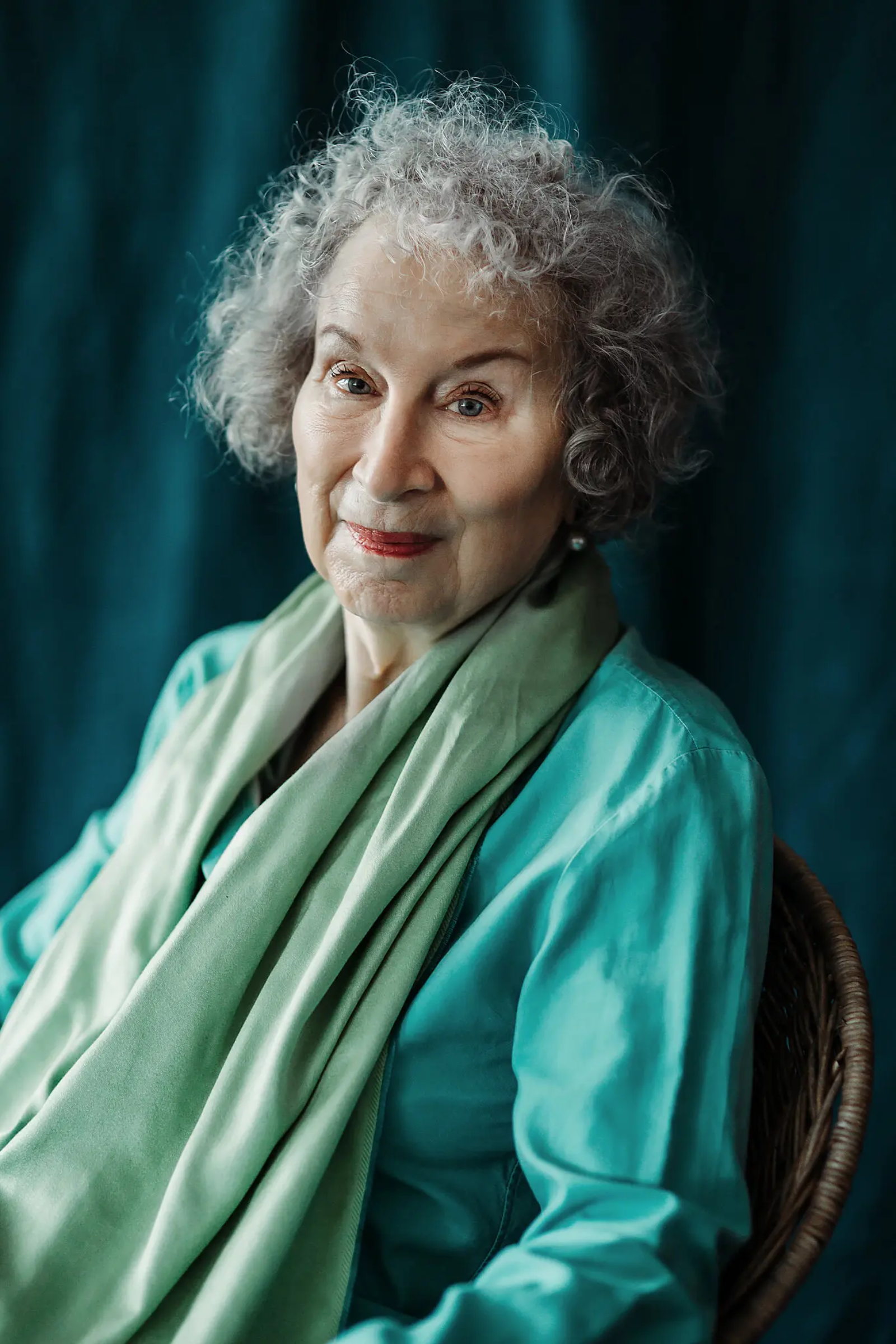
“Confronting Grief, With Margaret Atwood, in ’The Nurse Antigone’”
The New York Times / 2022
“Confronting Grief, With Margaret Atwood, in ’The Nurse Antigone’” by Alisha Haridasani Gupta
A dramatic reading by Theater of War Productions will include the author and practicing nurses who have held the front line of the pandemic.

“Front-line nurses star in online staging of play ‘Antigone’”
Associated Press / 2022
“Front-line nurses star in online staging of play ‘Antigone’” by Mark Kennedy
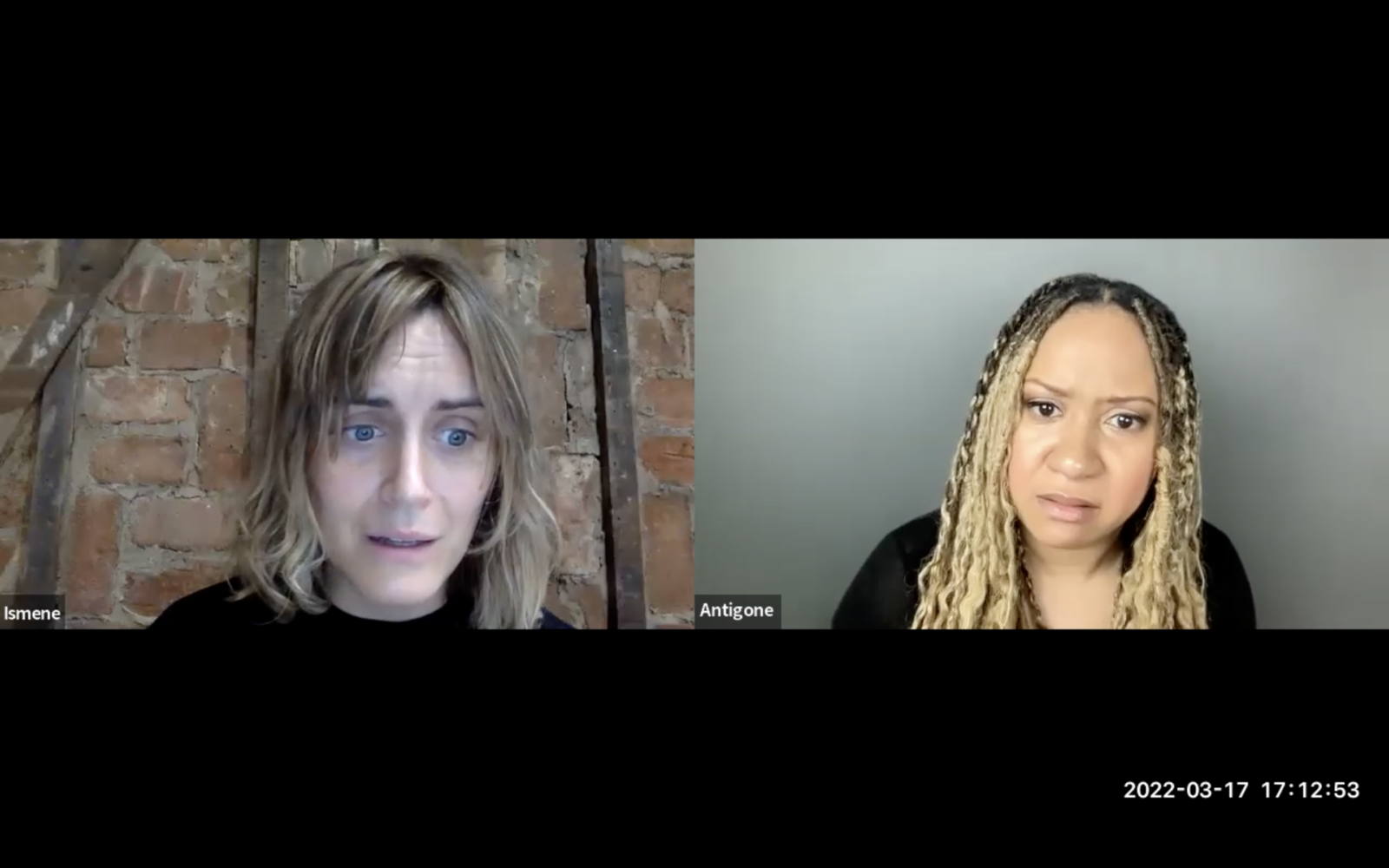
The Nurse Antigone Launch
On Zoom / 2022
Taylor Schilling plays Ismene and Tracie Thoms plays Antigone in The Nurse Antigone Launch.
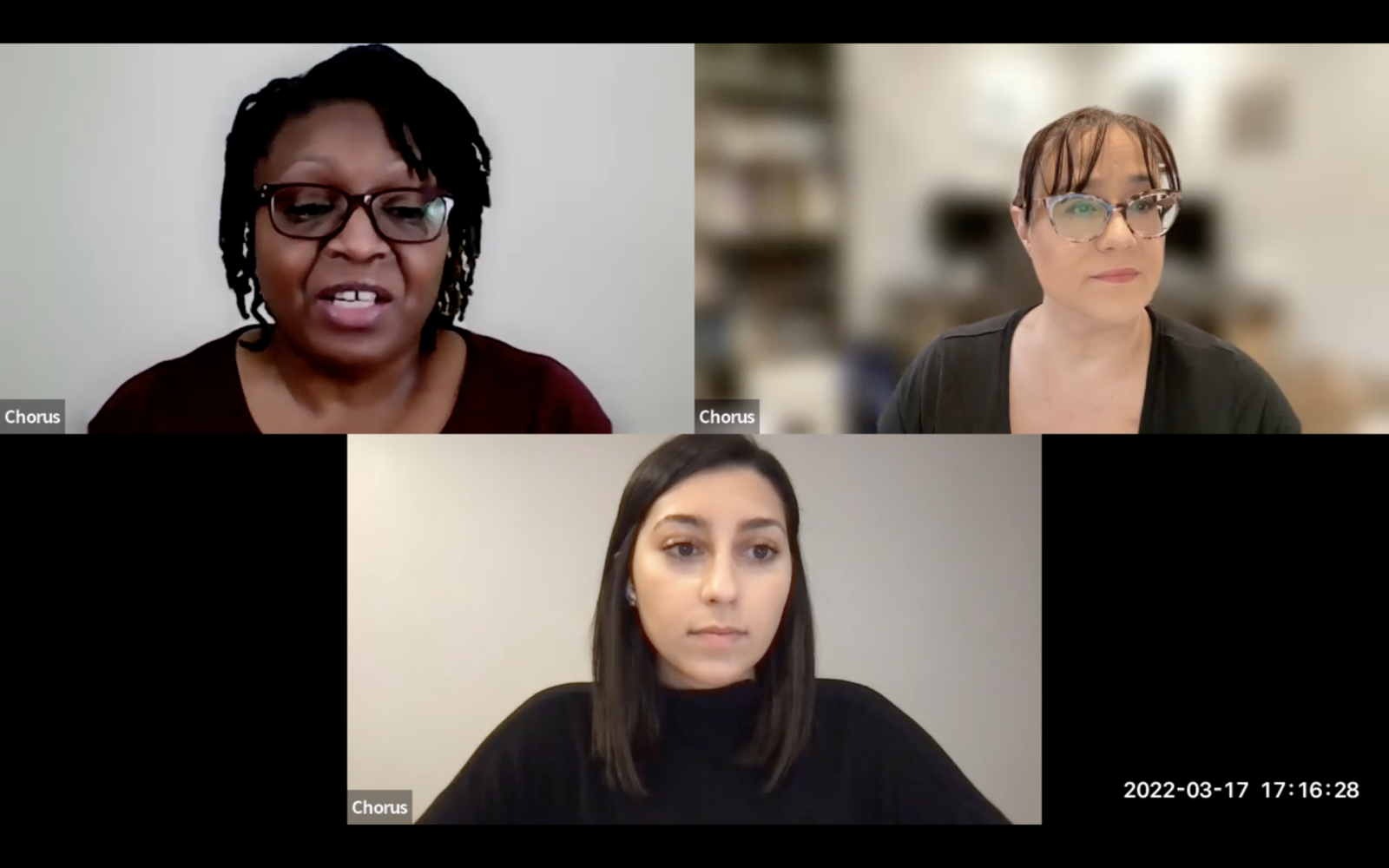
The Nurse Antigone Launch
On Zoom / 2022
The Inaugural Nurse Chorus: Charlaine Lasse (Registered Nurse, IV Therapy, Neonatal Intensive Care), Amy Smith (Nurse Practitioner, Northwell Health, Hofstra University), Aliki Argiropoulos (Nurse Clinician II, Blood and Marrow Transplant, Oncology Critical Care, Sidney Kimmel Comprehensive Cancer Center, The Johns Hopkins Hospital).
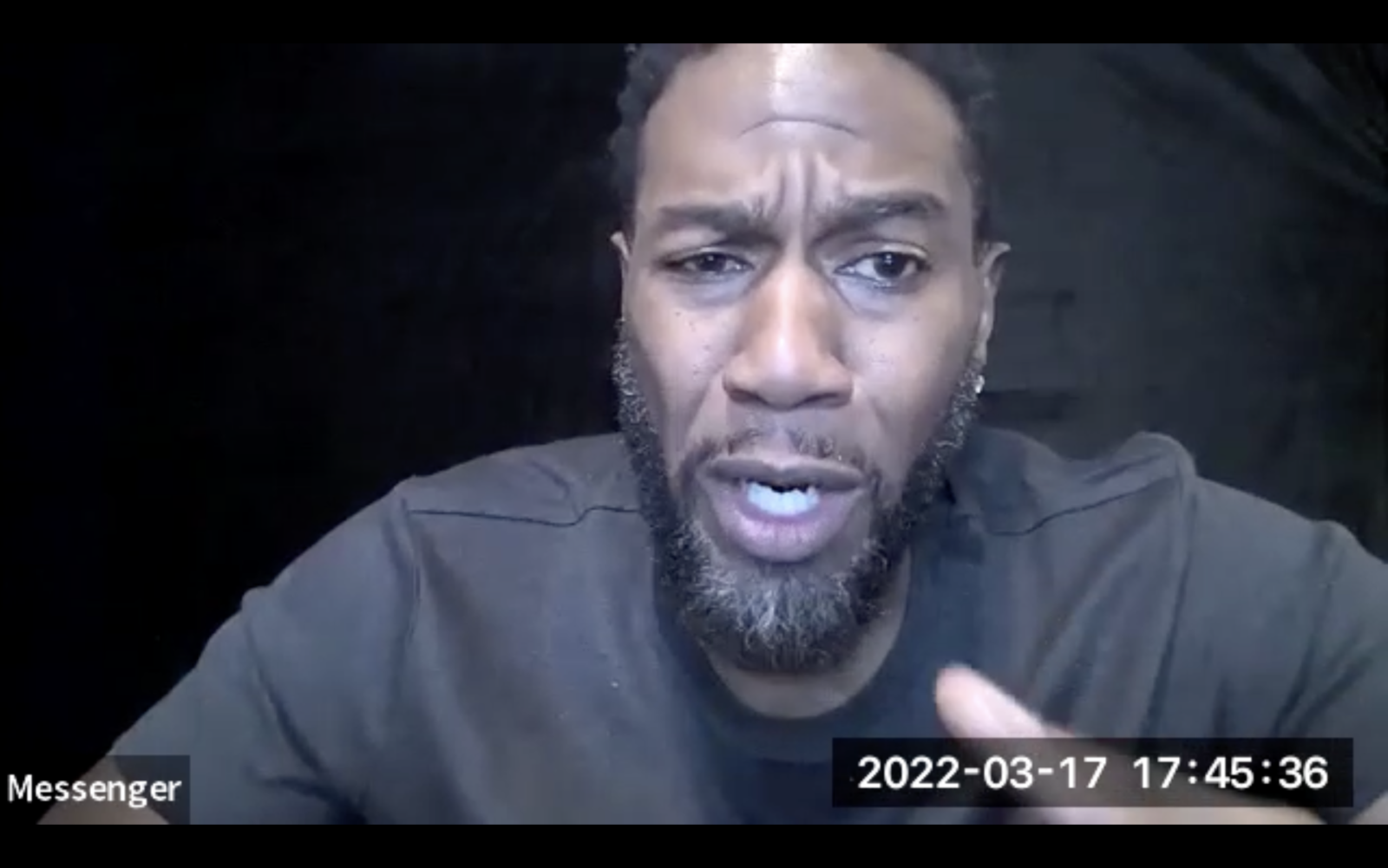
The Nurse Antigone Launch
On Zoom / 2022
NYC Public Advocate Jumaane Williams plays The Messenger in The Nurse Antigone Launch.
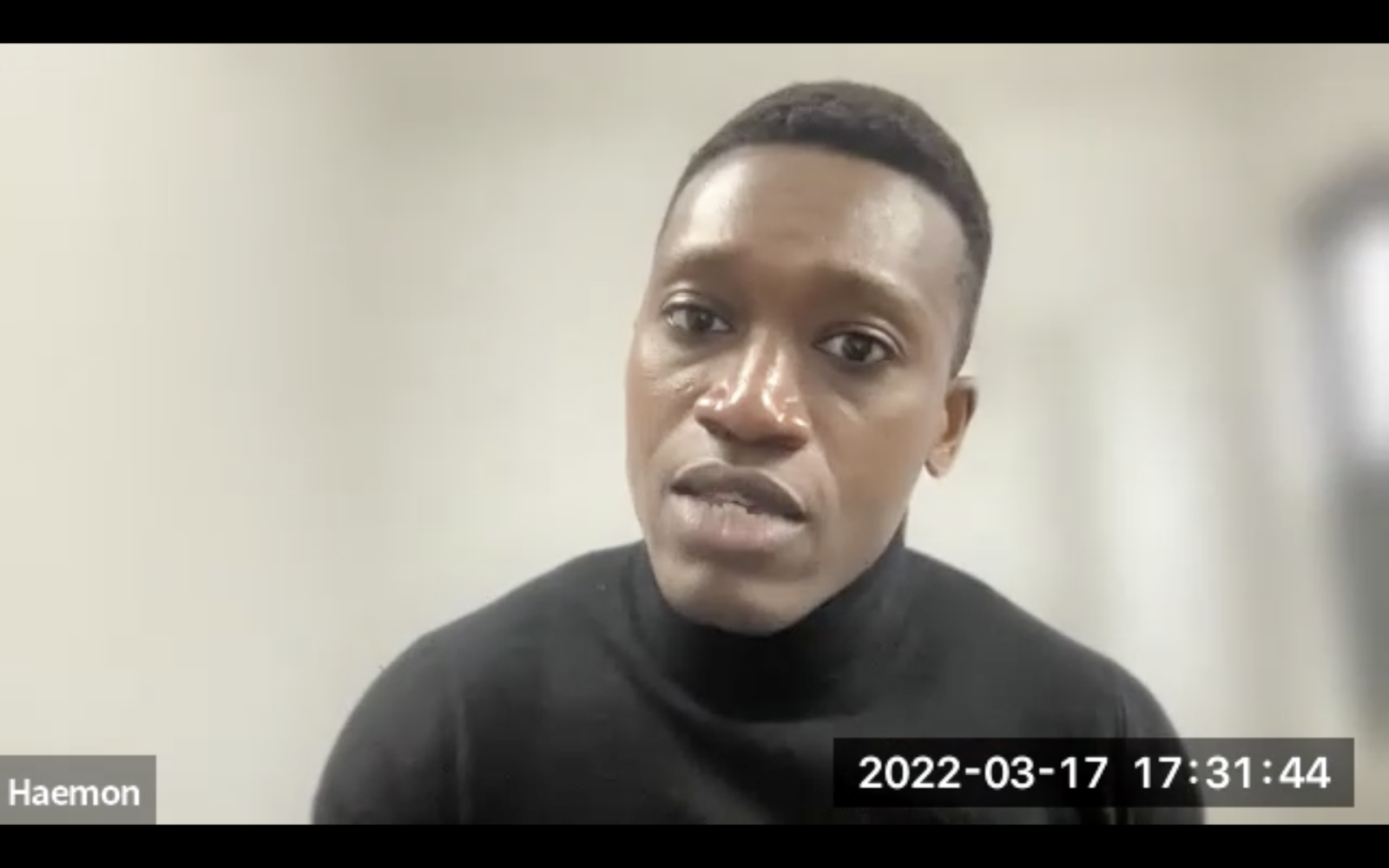
The Nurse Antigone Launch
On Zoom / 2022
Ato Blankson Wood plays Haemon in The Nurse Antigone Launch

The Nurse Antigone Launch
On Zoom / 2022
Tracie Thoms plays Antigone in The Nurse Antigone Launch.
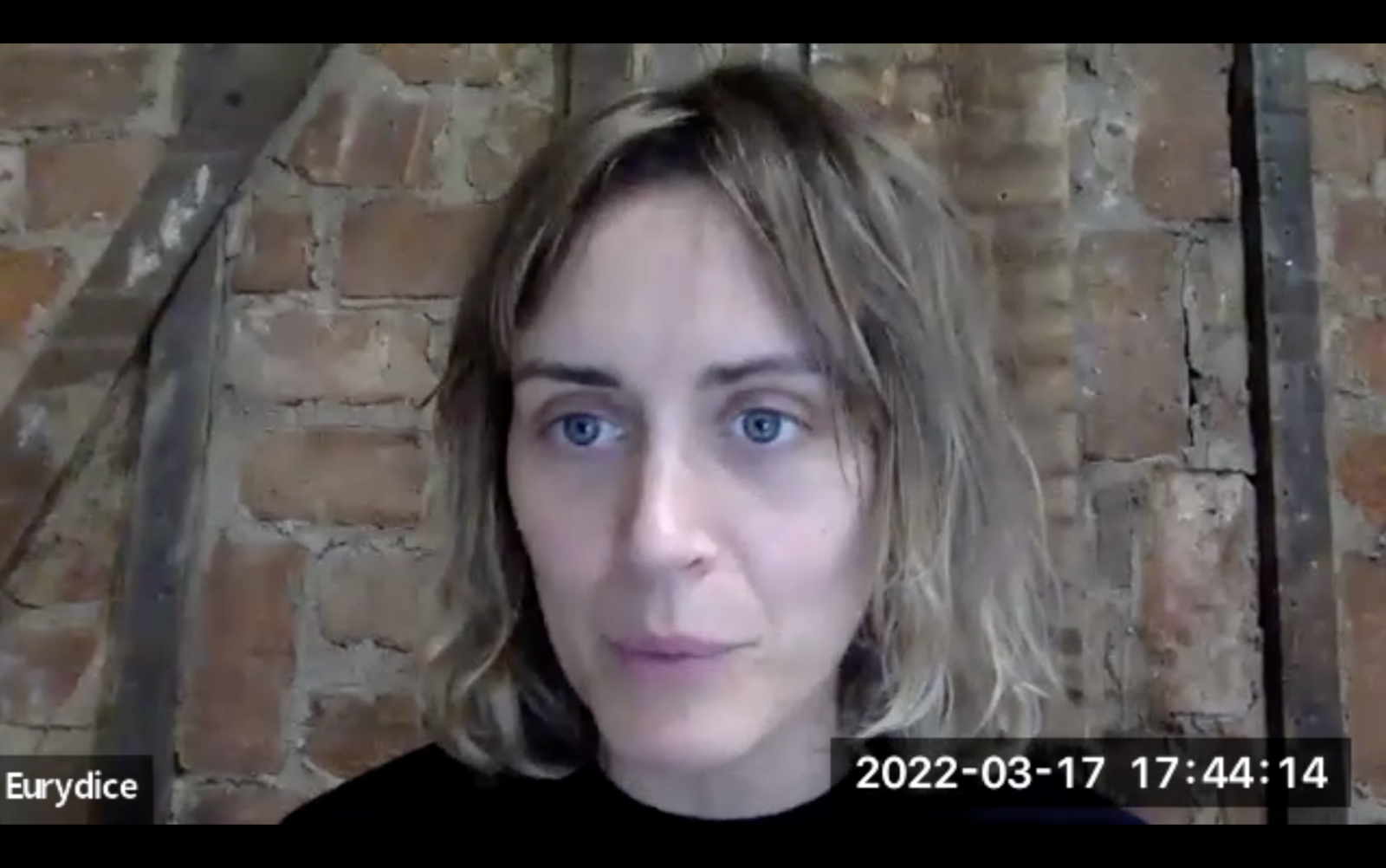
The Nurse Antigone Launch
On Zoom / 2022
Taylor Schilling plays Eurydice in The Nurse Antigone Launch.
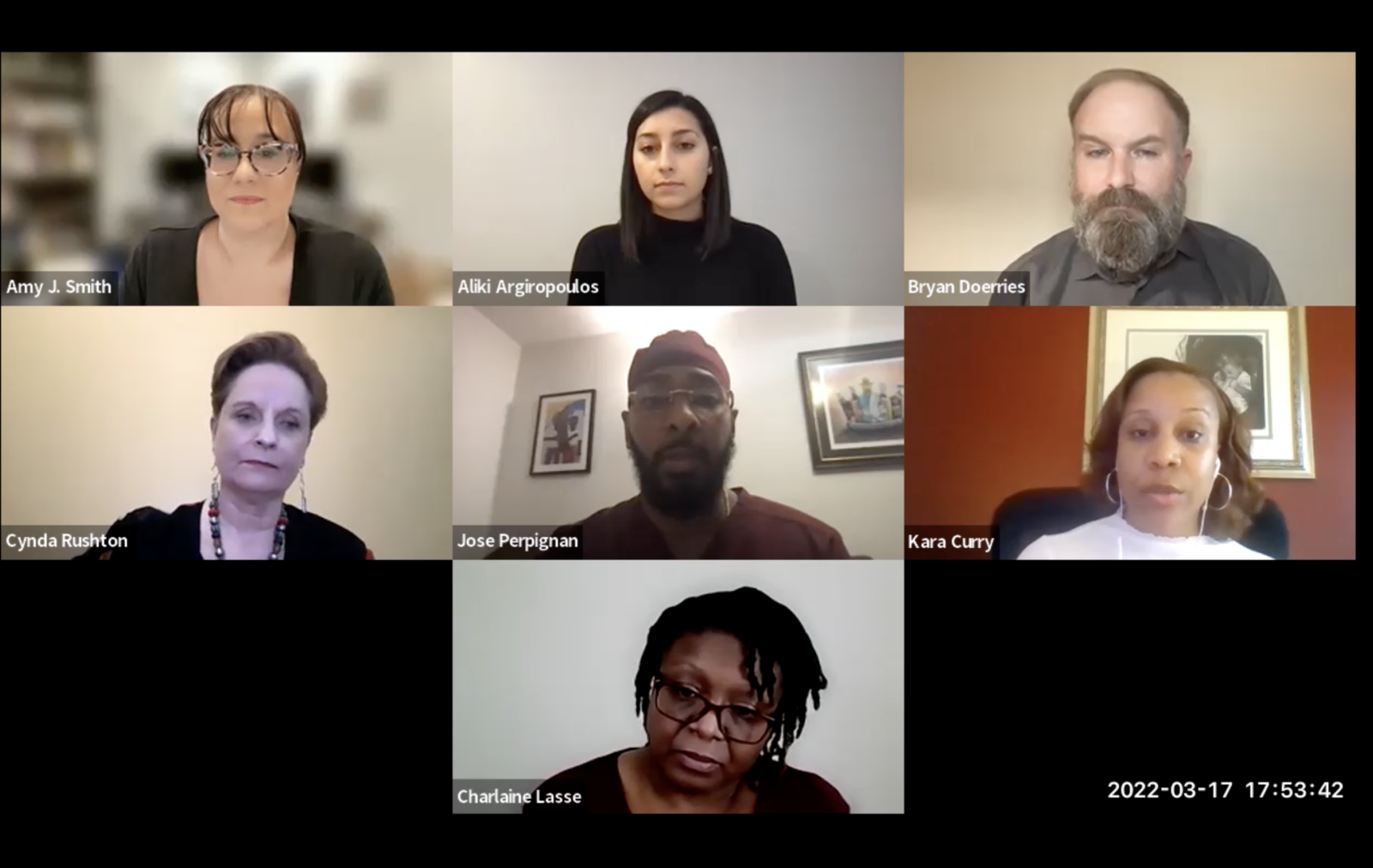
The Nurse Antigone Launch
On Zoom / 2022
Panelists in the Nurse Antigone Launch, discussion co-facilitated by Cynda Rushton and Bryan Doerries.
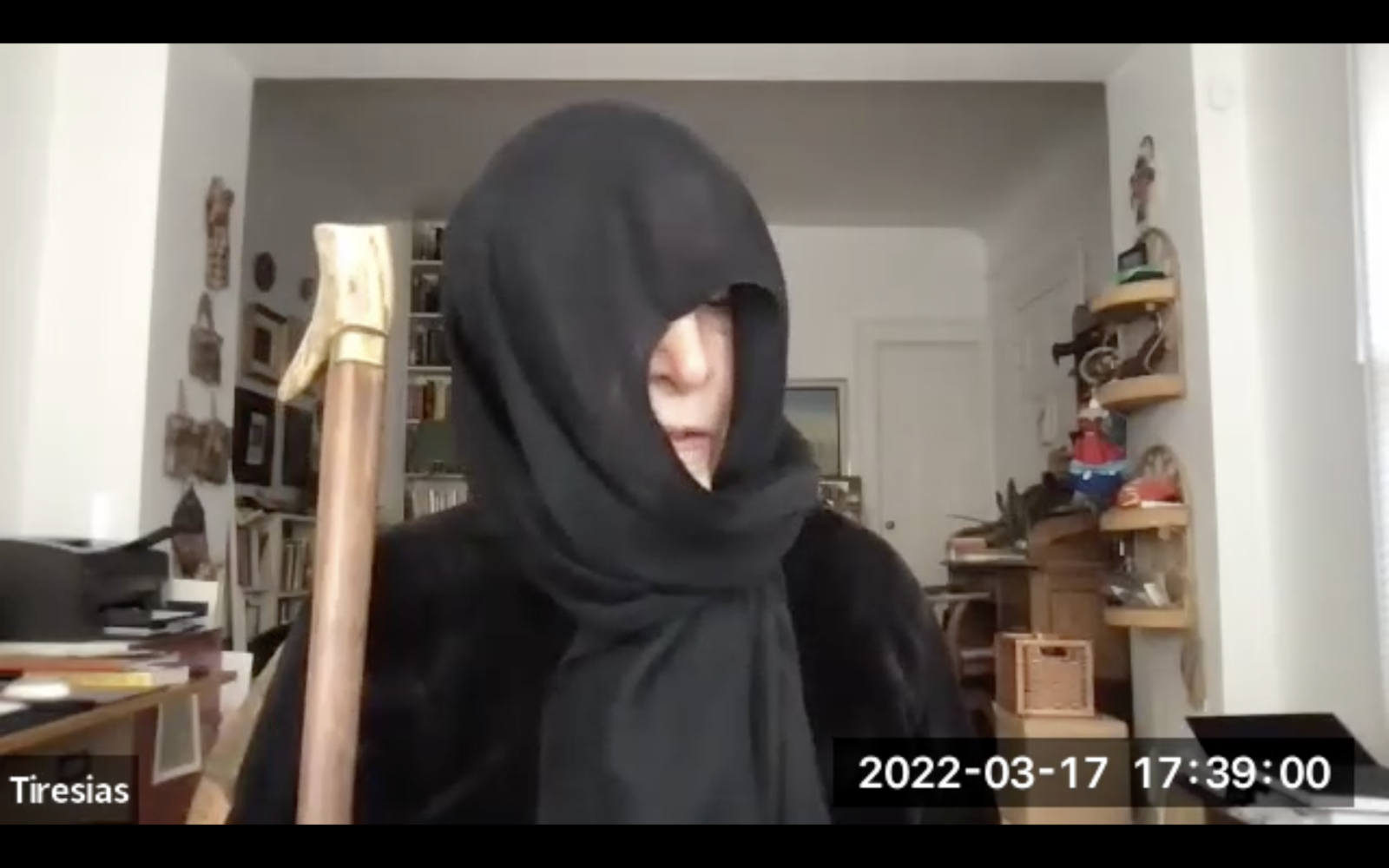
The Nurse Antigone Launch
On Zoom / 2022
Margaret Atwood plays Tiresias in The Nurse Antigone Launch.

The Nurse Antigone Launch
On Zoom / 2022
Bill Camp plays Creon in The Nurse Antigone Launch.
The Nurse Antigone Resources
-
Community Building Art Works to extend free writing workshops to healthcare workers who attend The Nurse Antigone
poeticrecord.org
If you are a nurse, for assistance with non-urgent psychological well-being needs, please email your inquiries to:
nurseantigone@ccainc.com
Explore Projects
-
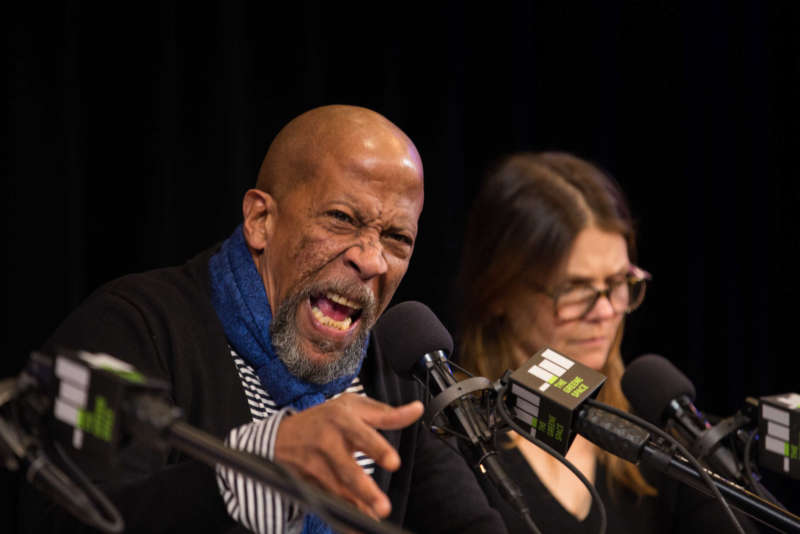 War & Mental HealthTheater of War
War & Mental HealthTheater of WarRooted in discussions about the invisible and visible wounds of war, the company’s hallmark project is designed to increase awareness of psychological health issues, disseminate information on available resources, and foster greater community cohesion.
-
 Pandemic & Climate CrisisPoetry for the Pandemic
Pandemic & Climate CrisisPoetry for the PandemicUsing poetry as a catalyst for an Intergenerational performance and discussion during the Covid-19 pandemic.
-
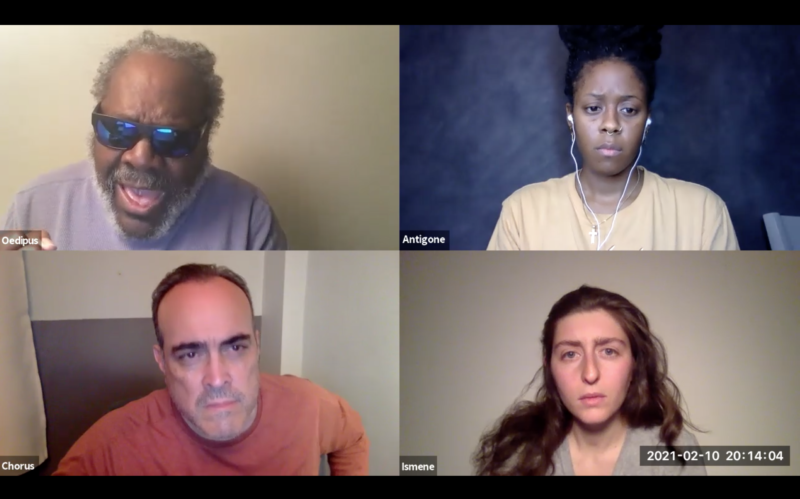 HomelessnessThe Oedipus at Colonus Project
HomelessnessThe Oedipus at Colonus ProjectThe Oedipus at Colonus Project presents readings of scenes from Sophocles’ final play, Oedipus at Colonus, as catalyst for powerful, community-driven conversations about homelessness, the immigration and refugee crisis, and the challenges of eldercare during and after the pandemic.












